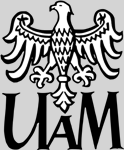Dorota Lipowska - Research
From Department of Applied Logic
| Revision as of 19:59, 27 June 2007 (edit) Lipowska (Talk | contribs) (New page: My research area is computational linguistics, in particular, methods of syntactic and semantic natural language analysis. Mainly, I am interested in formal grammars that can be employed i...) ← Previous diff |
Revision as of 20:02, 27 June 2007 (edit) (undo) Lipowska (Talk | contribs) Next diff → |
||
| Line 1: | Line 1: | ||
| + | [[Category:Staff]] | ||
| + | [[Category:Research]] | ||
| + | |||
| + | [[Dorota Lipowska - Curriculum Vitae]] | | ||
| + | [[Dorota Lipowska - Research]] | | ||
| + | [[Dorota Lipowska - Publications List]] | ||
| + | |||
| My research area is computational linguistics, in particular, methods of syntactic and semantic natural language analysis. Mainly, I am interested in formal grammars that can be employed in this field, especially as a basis for natural language parsers. In my PhD thesis, I have described the MLA grammar - a variant of a categorial grammar in which some features of the Montague grammar and Hausser’s left-associative grammar are combined. The parser I have implemented based on the MLA grammar analyses a sentence word by word from left to right (i.e., in the left-associative manner) building at the same time its tree analysis as well as its corresponding formula of intensional logic. | My research area is computational linguistics, in particular, methods of syntactic and semantic natural language analysis. Mainly, I am interested in formal grammars that can be employed in this field, especially as a basis for natural language parsers. In my PhD thesis, I have described the MLA grammar - a variant of a categorial grammar in which some features of the Montague grammar and Hausser’s left-associative grammar are combined. The parser I have implemented based on the MLA grammar analyses a sentence word by word from left to right (i.e., in the left-associative manner) building at the same time its tree analysis as well as its corresponding formula of intensional logic. | ||
| In addition, I cooperate with Prof. A. Lipowski (Institute of Physics, UAM) on computer modelling of some interdisciplinary problems. Using simulated annealing we study some variants of the travelling salesman problem. Moreover, we examine population dynamics (e.g., oscillations, extinctions) in lattice prey-predator models. Recently, using multi-agent modeling we study the emergence and evolution of language. | In addition, I cooperate with Prof. A. Lipowski (Institute of Physics, UAM) on computer modelling of some interdisciplinary problems. Using simulated annealing we study some variants of the travelling salesman problem. Moreover, we examine population dynamics (e.g., oscillations, extinctions) in lattice prey-predator models. Recently, using multi-agent modeling we study the emergence and evolution of language. | ||
Revision as of 20:02, 27 June 2007
Dorota Lipowska - Curriculum Vitae | Dorota Lipowska - Research | Dorota Lipowska - Publications List
My research area is computational linguistics, in particular, methods of syntactic and semantic natural language analysis. Mainly, I am interested in formal grammars that can be employed in this field, especially as a basis for natural language parsers. In my PhD thesis, I have described the MLA grammar - a variant of a categorial grammar in which some features of the Montague grammar and Hausser’s left-associative grammar are combined. The parser I have implemented based on the MLA grammar analyses a sentence word by word from left to right (i.e., in the left-associative manner) building at the same time its tree analysis as well as its corresponding formula of intensional logic.
In addition, I cooperate with Prof. A. Lipowski (Institute of Physics, UAM) on computer modelling of some interdisciplinary problems. Using simulated annealing we study some variants of the travelling salesman problem. Moreover, we examine population dynamics (e.g., oscillations, extinctions) in lattice prey-predator models. Recently, using multi-agent modeling we study the emergence and evolution of language.



